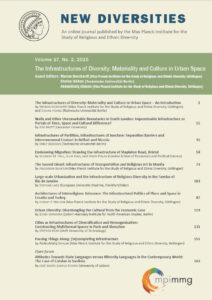Urban Diversity: Disentangling the Cultural from the Economic Case
by Boris Vormann (John-F.-Kennedy Institute for North American Studies, Berlin)
To cite this article: Vormann, B. (2015). Urban Diversity: Disentangling the Cultural from the Economic Case. New Diversities, 17(2), 119–129. https://doi.org/10.58002/ganw-m415
For many planners and city branders a pluralistic urban society, variation in architectural styles and mixed-uses render cities creative, competitive and more livable. Diversity, as the new orthodoxy in urban planning and policy, embodies the opposite of earlier, top-down modernist planning ideals. Reading diversity as a cipher for the market, as I set out to do in this article, lays bare the normative trajectories of these discourses of diversity. In so doing, I make two arguments. First, while it is often assumed that urban diversity makes cities more cosmopolitan and more economically productive, I contend that the cultural and economic logics of diversity are not mutually re-enforcing, but can often contradict one another. The same regime of market rule that supposedly leads to more diverse and livable postindustrial cities, produces increasing spatial inequalities. Second, I suggest that a perspective that highlights the structuring force of physical urban infrastructures sheds light on these pathdependent patterns of segregation, thereby allowing us to understand struggles over place and meaning in ways that move beyond the current limitations of diversity discourses.
Keywords: diversity, spatial inequalities, infrastructure, urban planning, Cosmopolitanism
|
